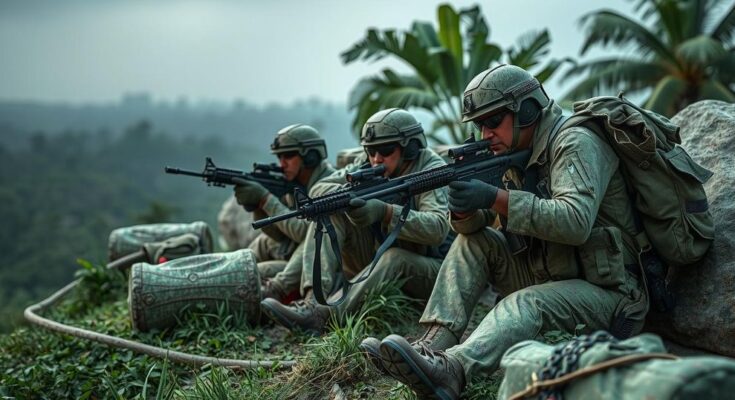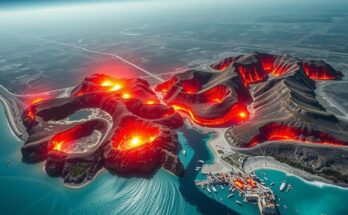The article discusses the role of foreign mercenaries, particularly Colonel Romuald and his team from Agemira, assisting the Congolese army in Goma against the M23 rebels. With significant compensation compared to local soldiers, these contractors face ethical scrutiny while attempting to stabilize the conflict-ridden region amidst allegations of illegal occupation by Rwanda. The situation remains precarious, with ongoing violence despite attempts at ceasefire and diplomatic negotiations.
Colonel Romuald, a seasoned veteran who served in the French army for over three decades, is currently stationed in Goma, the capital of North Kivu province in the Democratic Republic of the Congo (DRC). Instead of enjoying retirement, he leads a team at the private security company Agemira, providing crucial advisory services to the Congolese military in its struggle against the M23 rebel group. Agemira, in addition to offering military guidance, also manages aircraft operations, supplies, and arms deals for the soldiers on the ground.
The recruitment of Romuald’s team, predominantly comprised of his former comrades, signifies the ongoing support from foreign military contractors in the region. The Congolese government has partnered with Agemira and the Romanian military company RALF, both of which have made substantial contributions to defense efforts around Goma. RALF, boasting about 800 fighters, primarily composed of former members of the French Foreign Legion, has fortified the area against rebel advances, yet diplomatic efforts to establish peace have thus far proven ineffective.
Romuald firmly believes in the nobility of their mission to counteract what he defines as Rwanda’s illegal occupation of the DRC, which he views as a source of immense strife for the Congolese people. While he expressed confidence in an imminent resolution to the conflict, ongoing skirmishes and the disarray within local military ranks have led to a more complicated reality. The foreign mercenaries are compensated significantly more than their Congolese counterparts, which has generated feelings of inequality and resentment among local soldiers.
Despite claiming their role as mere advisors rather than mercenaries, Colonel Romuald and his team are acutely aware of the legal and ethical implications of their presence. He emphasizes the difference between their operations and those of infamous groups like the Wagner Group, underscoring a lack of evidence regarding any criminal activities related to Agemira or RALF. In conclusion, the situation in the DRC remains precarious, with the battle against the M23 rebel group continuing amid a complex web of local and international interests.
The situation in the Democratic Republic of the Congo, particularly in North Kivu province, has been tumultuous due to the resurgence of the M23 rebel group, which has sought to reclaim control over mineral-rich territories. In response, the Congolese government has enlisted support from foreign private military contractors, notably Agemira and RALF, to bolster its military capabilities. The involvement of these contractors highlights the intersection of international military influence and local conflict dynamics, drawing attention to issues of governance, security, and economic disparity in the region. This context elucidates the ongoing challenges faced by the Congolese military and the broader implications of foreign intervention in domestic conflicts.
This article provides insight into the complexities of foreign military involvement in the DRC, particularly in Goma, where private security firms, like Agemira and RALF, play a pivotal role in supporting local forces against the M23 rebels. Colonel Romuald’s commitment to his mission underscores the tensions between legal definitions of mercenary work and the practical realities of military support. The substantial wage disparities between foreign contractors and Congolese soldiers illustrate the socioeconomic challenges that persist, potentially affecting morale and unity within the ranks. Ultimately, the ongoing conflict reflects broader geopolitical issues and the struggle for resources, further complicating efforts for a peaceful resolution in the region.
Original Source: www.dw.com




